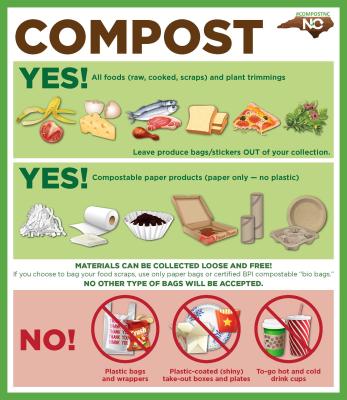Develop a food waste reduction program in your city or county and model sustainability for your residents and businesses. Each jurisdiction’s program will be different, so consider what type of program your department can realistically implement. Learn more about how you can prevent food waste.
Community Food Waste Reduction
There are growing efforts across the state to address food waste and provide additional resources to residents. See below for ideas on what you can do in your community:
- Partner with local businesses and encourage them to adopt food waste reduction strategies. Consider a recognition program for local businesses and organizations.
- Disseminate residential food waste reduction guides
- Launch a food waste reduction social media campaign using the Use the Food NC social media toolkit or develop your own. See City of Asheville’s Food Waste Reduction Initiative page.
- Form strategic partnerships with your local Soil and Water department, Cooperative Extension office and Food Council. Find a Food Council.
- Implement food waste reduction strategies within government offices.
- Provide compost options at government locations and events.
- Hold food donation events where individuals can easily donate food at temporary drop-off sites.
- Follow food service strategies for governments that have on-site food services
- Promote local farmers’ markets and other community-supported agriculture (CSAs).
Composting is a great addition to any solid waste program and can range from backyard compost bins sales to residential curbside collection. Below are ideas of what your program could look like as well as examples of what other communities are doing across North Carolina.
- Establish food waste drop-off sites to provide residents with a way to compost their food waste.
- Build a backyard compost demonstration site. See the Town of Cary’s Compost Education Center.
- Apply for the Food Waste reduction grant to help finance projects like a food waste drop-off site or a curbside food waste collection program.
- Sell backyard compost bins.
- Offer residential curbside food waste compost.
- Suggest residents consider private composters which can offer curbside food waste pick up if the jurisdiction does not have such programs.
- Encourage local schools to start food waste prevention programs.
Buncombe County
- Provides drop-off locations
- Partners with a local non-profit to offer compost workshops
City of Asheville
- Provides drop-off locations
- Partners with a local non-profit to offer compost workshops
City of Durham
- Testing a curbside food collection pilot program
City of Greensboro
- Sells compost bins
Chatham County
- Sells compost bins and kitchen collectors
- Offers compost workshops
Currituck County
- Sells compost bins
Granville County
- Compost bins available through Environmental Services Department
Guilford County
- Provides information on composting at Guilford County Cooperative Extension
Henderson County
- Provides a drop-off location
- Sells discounted compost bins
- Offers compost workshops
New Hanover County
- Operates a permitted in-vessel composter at the New Hanover County landfill
- Provides drop-off at landfill and offsite HazWagon
- Suggests setting up private collection with Wilmington Compost Company
Orange County
- Drop-off at several locations including Carrboro, Chapel Hill, and Eno River Farmers Markets
- Sells compost bins
- Offers compost demonstrations and workshops
Town of Cary
- Offers drop-off location at the Citizen’s Convenience Center
- Provides a compost demonstration and education site in Bond Park
- Sells compost bins
Wake County
- Offers drop-off locations
- Sells reduced price compost bins
Start a new program and want to be added to the list?
Please contact Organics Recycling Team Lead, Christine Wittmeier, at 919-707-8121 or at christine.wittmeier@deq.nc.gov.
North Carolina Food Donation and Compost Resource Map
The North Carolina Food Donation and Compost Resource map identifies resources to rescue edible food and manage food waste in and near the state for residents and businesses. It includes information on:
- Food banks
- Food scrap collection services
- Food scrap drop-offs
- Compost sites
- Compost resources.
Users can select any or all these layers to understand food recovery efforts in North Carolina and learn more about the resources available to them. Not all sites serve residential and commercial clients, and certain locations only serve residents of the town or county. Click on the site pins or use the tools to learn more.
The information on food scrap drop-off sites is provided in partnership with the North Carolina Composting Council. For additional information on purchasing bulk compost, visit NC Compost Council.




